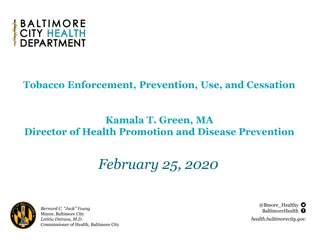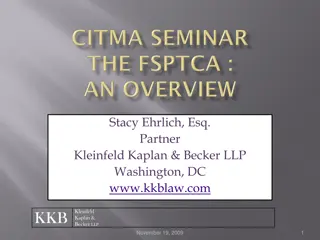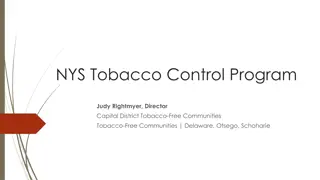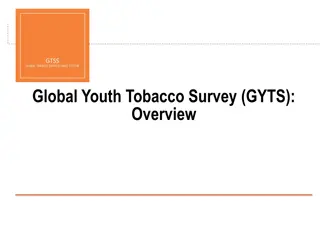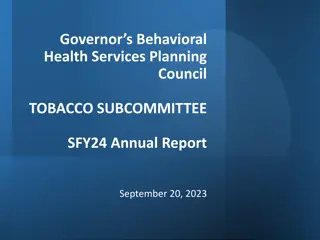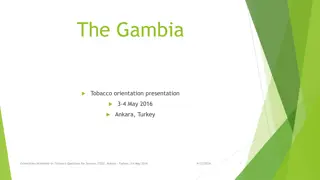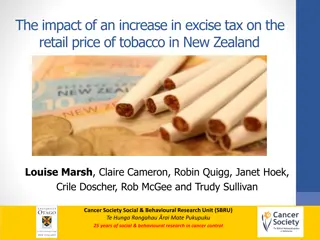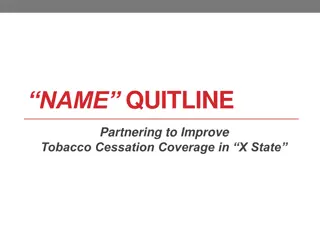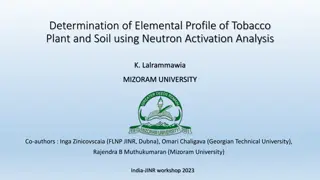Importance of Tobacco Retail Licensing for Preventing Youth Access
Tobacco companies strategically advertise and sell harmful products near youth-populated areas, prompting the need for stronger enforcement of tobacco laws. Tobacco Retail Licensing (TRL) is proposed as a solution to track and limit sales while curbing youth access. The American Heart Association advocates for stringent licensing laws to combat illegal sales and protect youth from harmful tobacco products.
Download Presentation

Please find below an Image/Link to download the presentation.
The content on the website is provided AS IS for your information and personal use only. It may not be sold, licensed, or shared on other websites without obtaining consent from the author. Download presentation by click this link. If you encounter any issues during the download, it is possible that the publisher has removed the file from their server.
E N D
Presentation Transcript
The Issue Tobacco companies intentionally advertise and sell harmful tobacco products, like cigarettes, e-cigarettes and chewing tobacco where youth gather and shop, near parks, churches, and even schools. The majority of urban public schools have a tobacco retailer nearby, often within 2 blocks.
The Issue Even though the legal sales age for tobacco is 21, 75% of kids who try to buy tobacco products are not refused sale. It s illegal to sell tobacco products to anyone under 21 but many places currently have no way of enforcing that.
The Solution Tobacco retail licensing, or TRL, requires stores that sell tobacco products to apply for a license to do so. It's a proven way to keep tobacco companies and their dangerous products away from kids.
Benefits of Tobacco Retail Licensing Track where tobacco products are sold: Most places don't have a complete list of stores that sell tobacco products. Requiring stores that sell tobacco products, like cigarettes, e-cigarettes and chewing tobacco, to apply for a license, would make it clear where tobacco products are being sold. Limit where tobacco products are sold: Licensing would also let communities set limits on the location, number, and types of stores that sell tobacco products.
Benefits of Tobacco Retail Licensing Curb youth use: With tobacco retail licensure, communities can monitor where tobacco products are being sold and who they're being sold to. Retailers that sell tobacco products, like cigarettes, e-cigarettes and chewing tobacco, to kids under the legal sales age can lose their license to sell tobacco. Enforce tobacco laws: Fees from licensing can be used to fund compliance checks, giving officials the resources needed to enforce tobacco laws and consequently reduce illegal tobacco sales to youth.
AHA's Stance We need strong tobacco retail licensing laws to effectively enforce tobacco laws and prevent youth access to harmful tobacco products, like cigarettes, e-cigarettes, chewing tobacco, and snuff.
AHA recommendations Eliminate youth penalties: Kids should not be penalized for purchase, use, or possession of harmful tobacco products that have been aggressively marketed and illegally sold to them. Tobacco retailers should be held accountable. Fine the license holder: Penalties for failing to follow tobacco control laws should be levied on the business owner rather than store employees, who are likely low-wage earners and unable to afford financial penalties. By holding the retailer accountable for fees and fines, proper training on tobacco control laws is more likely to take place. Allocate funding for compliance checks: Fees collected from retail licensing should be used to fund compliance checks to ensure retailers are not selling dangerous tobacco products, like cigarettes, e-cigarettes, and chewing tobacco, to kids.
Language to use and avoid Use This Language Instead of This Language Legal sales age Legal purchasing age Tobacco retailers, including grocery stores, gas stations, and convenience stores Tobacco retailers or places where tobacco products are sold Strong retail licensure requirements More regulations on retailers Laws that criminalize youth for purchasing, using, or possessing tobacco products PUP laws, Purchase, Use and Possession laws Tobacco companies Big Tobacco, tobacco industry (unless providing a contemporary or specific example) Tobacco products, like cigarettes, e-cigarettes, chewing tobacco, and snuff Tobacco products Tobacco use, e-cigarette use Smoking, vaping E-cigarettes, such as vapes or Juul (may use as description) Vapes, Juul (do not use independently or as substitute for e- cigarettes)
Other Resources TRL key messages: Includes definitions, tips on framing and different buckets of messages (e.g., youth use, compliance, equity) TRL fast facts: Digestible facts to support key messages TRL infographic: Visual representation of the problem and solution TRL social copy: Ready to use tweets that can be customized TRL GIFs: Animated GIFs that explain the benefits of TRL TRL grassroots alert: Email to send to advocates when TRL developments occur



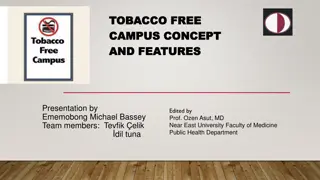
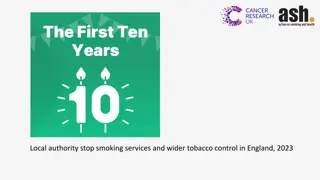
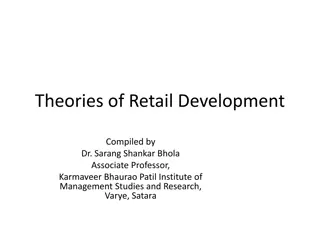

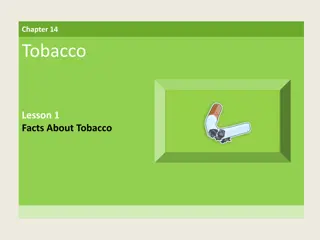
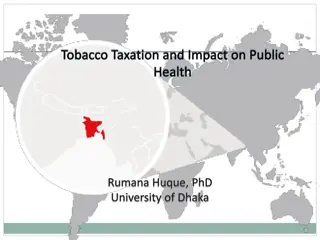
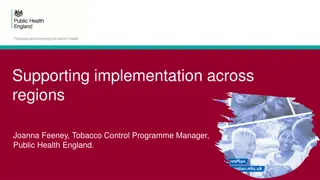

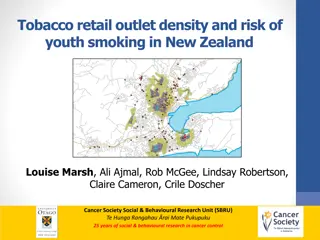
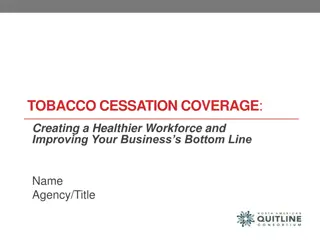
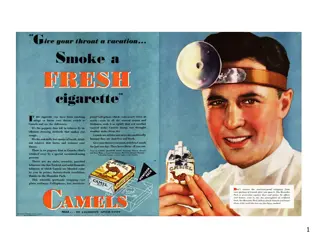
![Protecting Youth Through Tobacco Retail Licensing in [Your County]](/thumb/175307/protecting-youth-through-tobacco-retail-licensing-in-your-county.jpg)
